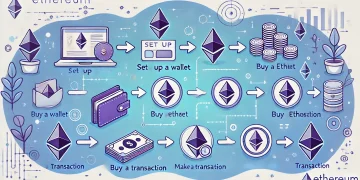The evolution of cloud storage has taken a revolutionary turn with the emergence of blockchain technology. Decentralized cloud storage solutions represent a paradigm shift in how we store, manage, and secure digital data. By leveraging blockchain’s inherent characteristics of decentralization, transparency, and immutability, these systems are challenging traditional centralized storage providers and creating new possibilities for data management in the digital age.
The Fundamentals of Decentralized Storage
At its core, decentralized cloud storage operates on a fundamentally different principle than traditional centralized solutions. Instead of storing data in massive data centers controlled by a single entity, decentralized storage systems distribute data across a network of nodes operated by individual participants. This approach not only enhances data security but also improves accessibility and reduces the risk of service interruptions.
The blockchain serves as the backbone of these systems, maintaining records of file locations, managing access rights, and facilitating the economic incentives that keep the network operational. Through smart contracts and cryptographic protocols, these systems ensure that data remains secure, accessible, and properly compensated for those providing storage resources.
Technical Architecture and Implementation
The technical infrastructure of blockchain-based storage solutions combines several sophisticated components working in harmony. Files uploaded to these networks are typically broken down into smaller chunks, encrypted, and distributed across multiple nodes. This process, known as sharding, ensures that no single node holds complete files, enhancing both security and privacy.
Smart contracts play a crucial role in managing storage agreements between users and storage providers. These automated agreements handle everything from payment processing to service level agreements, ensuring transparent and efficient operation of the storage network. The blockchain maintains an immutable record of these agreements and file locations, enabling reliable file retrieval and access management.
Economic Incentives and Token Economics
The sustainability of decentralized storage networks relies heavily on well-designed economic incentives. Storage providers are rewarded with native tokens for contributing their disk space and maintaining high availability. These token-based systems create a marketplace where storage prices are determined by supply and demand rather than arbitrary corporate pricing structures.
Users benefit from this competitive marketplace through lower storage costs and more flexible payment options. The ability to pay for storage using cryptocurrency opens up these services to a global audience, including those without access to traditional banking services. This economic model has proven particularly effective in incentivizing network growth and maintaining service quality.
Advantages Over Traditional Cloud Storage
Decentralized storage solutions offer several compelling advantages over their centralized counterparts. Privacy and security are significantly enhanced through encryption and data distribution, making it extremely difficult for bad actors to access or compromise stored information. The absence of a single point of failure increases system reliability and resistance to outages.
Cost efficiency represents another major advantage, as decentralized networks can utilize excess storage capacity more effectively than centralized data centers. This efficiency, combined with reduced overhead costs, often translates to lower prices for end users. The global distribution of storage nodes also improves access speeds by allowing users to retrieve data from geographically closer locations.
Real-World Applications and Use Cases
The applications of blockchain-based storage extend far beyond simple file storage. Content delivery networks (CDNs) built on decentralized storage platforms can provide more efficient and cost-effective distribution of media content. Healthcare organizations are exploring these solutions for secure patient data storage, while educational institutions are using them to maintain academic records and research data.
Businesses are finding innovative ways to leverage decentralized storage for backup solutions, document management, and collaborative workflows. The immutable nature of blockchain records makes these systems particularly valuable for maintaining audit trails and ensuring regulatory compliance in sensitive industries.
Current Market Leaders and Solutions
Several prominent projects have emerged in the decentralized storage space, each with unique approaches and technological innovations. Filecoin, built by Protocol Labs, has created one of the largest decentralized storage networks, while Sia offers highly competitive pricing through its automated marketplace. Storj has focused on enterprise solutions, providing tools and interfaces familiar to traditional cloud storage users.
These platforms continue to evolve, adding features and improving performance to meet growing user demands. Integration with other blockchain networks and decentralized applications (dApps) has created new use cases and expanded the potential applications of decentralized storage.
Challenges and Future Developments
Despite their promise, decentralized storage solutions face several challenges. Network scalability remains a concern as these systems grow, requiring ongoing technical innovations to maintain performance. User experience and ease of integration with existing applications represent another area requiring continued improvement to achieve mainstream adoption.
The future of decentralized storage looks promising, with several exciting developments on the horizon. Advanced encryption techniques and zero-knowledge proofs are being integrated to enhance privacy protections. Cross-chain compatibility and improved interoperability are making these systems more accessible and versatile.
Frequently Asked Questions
How does blockchain ensure data security in decentralized storage?
Blockchain technology ensures data security through encryption, data sharding, and distributed storage across multiple nodes. Smart contracts manage access control, while the immutable ledger maintains records of file locations and transactions.
What are the cost benefits of decentralized storage?
Decentralized storage often offers lower costs due to reduced overhead, efficient resource utilization, and competitive marketplace dynamics. Users typically pay only for the storage they use, with prices determined by market forces.
How reliable is decentralized cloud storage?
Decentralized storage systems achieve high reliability through redundancy and distributed architecture. Multiple copies of data are stored across different nodes, eliminating single points of failure and ensuring continuous availability.
Can decentralized storage handle large-scale enterprise needs?
Yes, many decentralized storage solutions are designed to scale for enterprise use, offering features like access control, audit trails, and integration capabilities with existing systems.
What types of files can be stored on decentralized networks?
Decentralized storage networks can handle any type of digital file, from documents and images to videos and application data. File size limitations and storage costs vary by platform.
How does retrieval speed compare to traditional cloud storage?
Retrieval speeds can often match or exceed traditional cloud storage, especially when accessing data from geographically distributed nodes. However, performance can vary based on network conditions and file sizes.
What happens if a storage node goes offline?
Decentralized networks maintain multiple copies of data across different nodes. If one node goes offline, the system automatically redistributes data to maintain redundancy and ensure continuous availability.




























